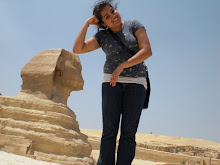
In my time here thus far, I've really learned just how much the Spanish love their holidays. Not content with just having Christmas and New Years' (and of course, Christmas Eve (Noche Buena) and New Years' Eve (Noche Vieja), the Spanish must save the best celebration for last: Three Kings' Day (Dia de los Reyes Magos).
In case you're not familiar with the Three Kings, the gist of the story is that three Zoroastrian priests, who were really into astrology, read the stars and recognized that Baby Jesus was born. They came "from the East" and each brought a gift to Baby Jesus.

In modern times, some Latin American countries still celebrate Three Kings' Day, usually eating a "rosca de reyes" and often giving small gifts to children. I myself remember getting a small gold bracelet from my godparents when I was 7 for Three Kings' Day. In Spain, however, all major presents are reserved for Three Kings Day. So it's a pretty big deal.
Madrid has a huge parade, which conveniently starts about 3 blocks from my house. You'd better believe I attended. The parade has lots of the usual stuff -- lots of floats, costumes, etc. -- in addition to throwing out candy and small toys from the floats.
What I found most interesting about the holidays, however, occurred while I was riding the train earlier that day. As I sat to observe the people around me, I saw a family of Asian immigrants (I assume Chinese, as that seems to be the majority here) carrying a roscon and a bag of wrapped gifts. They were speaking Spanish with an accent, and making jokes. As I eavesdropped on the family, I began thinking about the tradition of eating this roscon, something I have always heard about but never really done (in this city, the lines in the bakeries selling the roscon were often out the door and down the street).
While looking at this immigrant family, I started thinking about assimilation. I wondered when this family first started buying a roscon, and why they did it? Is this also a Chinese tradition that I was unfamiliar with? Like me, did they cave into buying a roscon because they saw that everyone (and their mothers) bought one as well? Do they enjoy this tradition, or do they do it to fit in with the other families? Are the pressures to assimilate too great for them to maintain their old traditions? And is it right for them to give up their old traditions and take up the ones of their new homeland?
I often think about these thoughts in the context of American immigrants, but that incident made me think about the pressures of immigrants in general. Losing your culture, picking up new traditions and the like aren't only problems for immigrants to a certain country; it's really something that people all over the world have to deal with. Maybe, as I'm here trying to avoid falling into the Spanish lisp trap, some Spaniard in the States is trying to convince his coworkers that just because he's Hispanic doesn't mean he loves to eat spicy food.

No comments:
Post a Comment